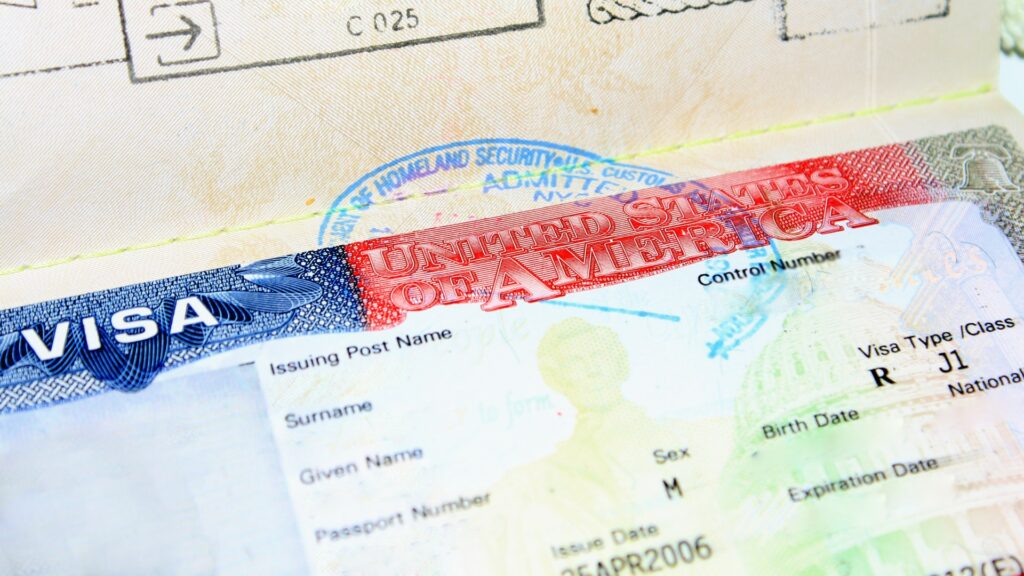A J-1 visa permits foreign nationals from any country to come to the United States in an exchange program designated by the U.S. Department of State.
The foreign national must enter the United States for the purpose of teaching, instructing, lecturing, studying, observing, conducting research, consulting, demonstrating special skills or receiving training.
In order to receive a J-1 visa, a foreign national must apply for and be accepted by an exchange visitor program designated by the U.S. Department of State. Upon acceptance, the foreign national must apply directly to a U.S. Consulate or Embassy for a J-1 visa stamp.
The foreign national must have a residence in a foreign country which they have no intention of abandoning. The foreign national must demonstrate sufficient knowledge of English to participate in the program and demonstrate access to sufficient funds to cover expenses.
All J-1 applicants must have health insurance which meets U.S. Department of State minimum requirements. J-1 visa holders must also be paid commensurately with others in similar occupations.
The J-1 visa program was designed to facilitate international exchanges. The primary purpose is to expose foreign visitors to American methodologies, expertise and culture and share that learning and experience upon return to their home countries.
Categories
There are multiple J-1 visa categories, which include:
J-1 Trainee Visa
While the J-1 visa allows participants to pursue a variety of activities, the category most applicable to the private sector is that of “Trainee.”
The law requires that the Trainee participant possess a foreign degree or, alternatively, have five years of work experience abroad prior to participation.
A J-1 Trainee may be admitted for training activities which can include, but are not limited to, guided special projects or other specific activities; supervised research; consulting; participation in seminars or conferences; and learning specialized skills.
Training activities can be demonstrated by maintaining learning journals; establishing training goals with structured and periodic evaluations; and rotation through departments.
To be eligible for a J-1 Trainee Visa, a foreign national must:
- Possess a foreign degree or certificate from a post-secondary academic institution and one year of experience in their field acquired outside of the U.S.
OR
- Possess five years of work experience in their field acquired outside of the U.S.;
- Possess English language skills verified by either a recognized English language test, certification from an academic institution, or through an interview with the sponsor conducted in-person or by video or web-camera conference;
- Provide a detailed training program (by employer) and provide a statement of motivation (by the trainee) as well as a Department of State Form DS 7002 signed by the trainee, the employer and the sponsor prior to submission; and
- Not have participated in a J-1 Trainee or Intern program in the past two years.
J-1 Summer Work Visa
The purpose of the Summer Work category is to provide foreign post-secondary students an opportunity to become directly involved in the daily life of the people of the United States through travel and temporary work for a period up to four months during their summer vacation. Repeat participation is allowed if the foreign national maintains their student status abroad.
To be eligible for a J-1 Summer Work Visa, foreign nationals must:
- Be currently enrolled in a foreign post-secondary academic institution and provide proof of returning to that institution following the summer work program;
- Show evidence of sufficient English skills to participate in the U.S. program;
- Provide a recommendation letter in English.
J-1 Intern Visa
The purpose of the Intern category is to provide the opportunity to enhance skills in a chosen career field through participation in a structured training program and to build on knowledge of American culture, techniques, methodologies or expertise within the field of endeavor.
The program may not exceed 12 months, although repeat participation is allowed if the Intern maintains their student status abroad.
To be eligible for a J-1 Intern Visa, foreign nationals must:
- Be currently enrolled in a foreign post-secondary academic institution.
OR
- Have graduated from a foreign post-secondary academic institution within 12 months of beginning the J-1 Intern program;
- Possess English skills verified by either a recognized English language test, certification from an academic institution, or through an interview with the sponsor conducted in-person or by video or web-camera conference;
- Provide a detailed internship program (by employer) and provide a statement of motivation (by student) as well as a Department of State Form DS 7002 signed by the intern, the employer and the sponsor prior to submission.

